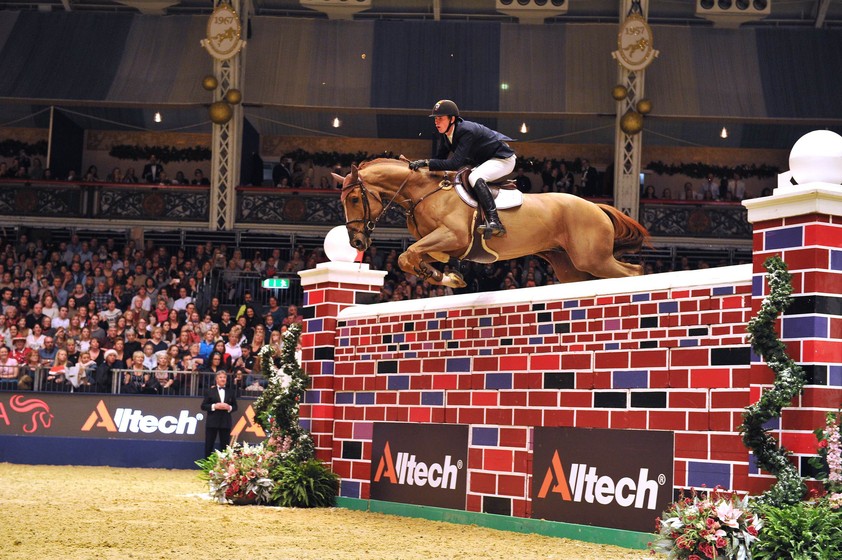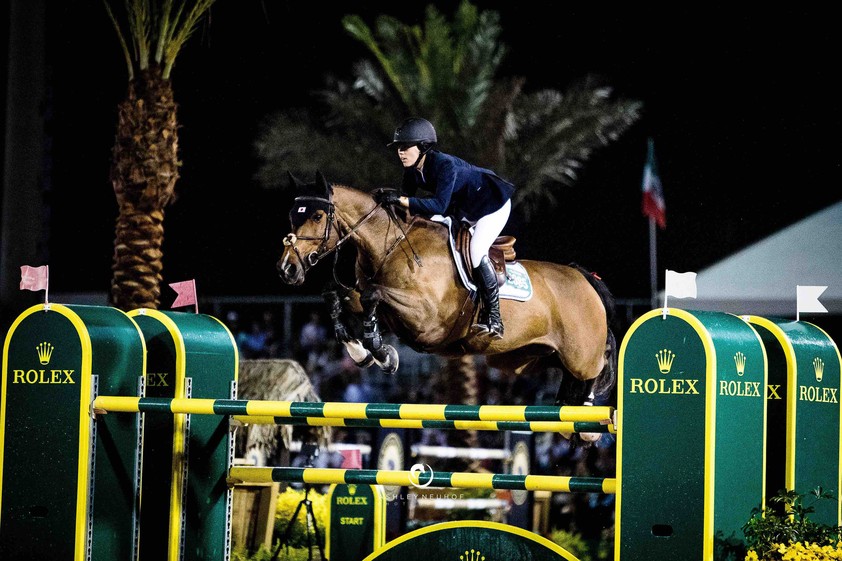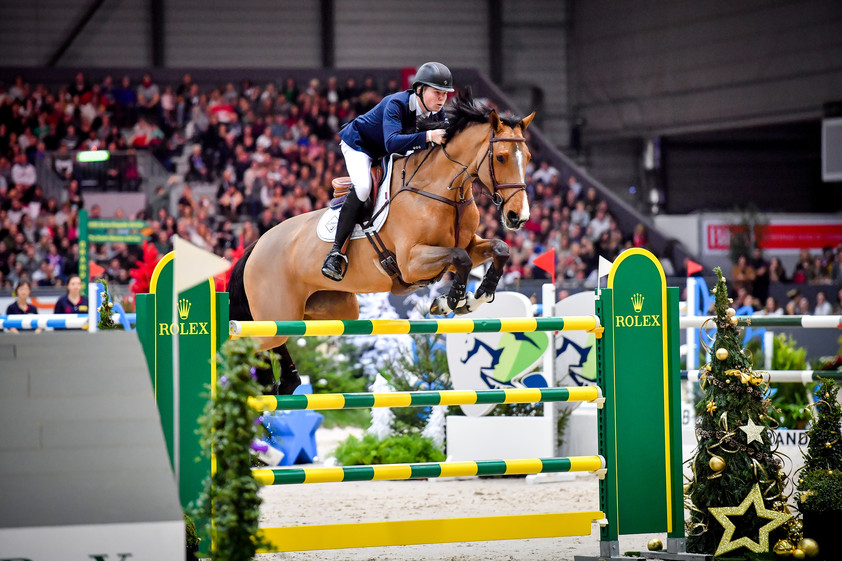This week, the Rolex Grand Slam of Show Jumping has been catching up with the new generation in professional show jumping. Almost 40 year’s younger than some of their senior competitors, we took a look at how initiatives such as the Young Riders Academy and the introduction of U25 competitions at the Majors, gives young riders the opportunity to break into the senior world.
Words from Harry Charles
Young rising star of show jumping
When did you decide you wanted to pursue a career in show jumping?
When I was about 14 years-old, I won a big pony class in England, which at the time was probably the biggest class you could win at 16 years of age and younger, so I won that and got such a good buzz of it and realized this is exactly what I want to pursue a career in.
Do you think if you hadn’t have competed at CHIO Aachen your career wouldn’t have progressed the way it has?
Realistically CHIO Aachen is one of the biggest shows in the world. There’s so much that sponsors and event organizers can do now, so if I hadn’t gone to Aachen as young as I was at the time, I don’t think I would have got the opportunities that I have now been given.
What other opportunities have you had since then?
I think the main thing is that it has helped me connect with important people and sponsors within the sport. I made a lot of great contacts and friends there so there were so many benefits from doing that and lots of opportunities have opened up since last year.
What do you think are the three most important attributes for being a professional show jumper?
The first one is patience, something which I must improve a bit. I think it’s important because of the injuries associated with the sport, especially the horses. You can get a really talented rider who might have to sit back for a few years because of a horse being injured or maybe not having enough experience yet. You must let the horse develop at its own pace.
Second one I think is that you have to be mentally strong, something I work very hard on. I think I’m quite lucky that I am naturally quite mentally strong, but I have had to develop a lot in this area. I remember I always used to get really annoyed when I started doing the big shows and my head would drop a bit if I hit a fence, but now having a bit more experience, you realise it’s not the end of the world. As long as you learn from your mistakes, that’s all that really matters.
I think the third one is good work ethic. When I’m off the horses I now do a lot of gym work and specific training. My father once said you can never stop improving and I think that’s such a great mindset to have in this sport because you are working with two athletes; you and the horse.
Can you talk about the 5* horses you currently have? What do you see for them in the future?
I think we have got a good group of horses; I think ABC Quantum Cruise is the best horse I have at the moment. I still think he is maybe a year or two off hitting his peak, so I don’t think I have got the best out of him yet, but he is very good and very consistent. We work with him every day to try and improve him, so hopefully you will see the best of him soon.
Who are your idols / which riders do you look up to?
For me it has always been Scott [Brash]. As well as great rider, he’s a really nice guy too so he is definitely my idol. We talk about everything actually and he is always willing to help me out and lend a hand. Especially when I started doing the big shows, he was always the first one who would come and sit with me at breakfast in the morning when I didn’t know anyone, which I really appreciated.
Do you get nervous competing against them?
Not really, it makes me hungrier to be honest and it makes me want to win more. I am pretty confident, and I like to think I actually thrive on pressure and it makes me ride better.
You are almost 40 year’s younger than some of top riders who are still competing – what are the tools you need to have such a long career?
I think you have got to have patience; you don’t want to push it all too quickly. If you play it right, it can be a long sport. You’ve got to take care of yourself. I always see riders in the gym. The sport has changed so much and the margins are so tight now, I think gym work has become more important than it ever used to be.
What has been the highlight of your career so far?
Definitely competing in the Rolex Grand Prix in Aachen, that has always been the dream of mine since I was small and to be able to do it was incredible. I still have to pinch myself that I have done it to be honest with you. Sometimes when I am hacking with ABC Quantum Cruise at home, I look down and say to him, ”can you believe that we jumped the Rolex Grand Prix at Aachen”!
Now that you have tried competing in a Major, is the Rolex Grand Slam a long-term goal?
I would love to win at least one of the Rolex Majors and of course the Rolex Grand Slam, but by the time I’m 25 I would love to have won one and I think in five years its possible.
The Rolex Grand Slam Majors are promoting youth by organizing more and more U25 competitions, what is your point of view on this?
I think it is great, any chance for a young rider to jump in a top-level event like any of the Rolex shows is massively important and influential. Being among the top riders with a big crowd is just amazing, not only to inspire and motivate young riders, but also for their exposure. For example, when I was in Aachen, so many people contacted me, and I think I gained about 400 followers on my social media platforms each day I was there. Taking part in these events really does give you drive, and although you may only be able to jump two classes, it makes you even more motivated at the idea of jumping more later down the line.
If you weren’t a professional show jumper, what would you be?
I would love to be a pilot. I have a very big interest in aviation and I am actually doing my private pilot’s license.
What’s the best piece of advice you have been given?
A piece of advice I was given was that when the horse knocks a pole down, 9/10 times it’s your fault even if you think it’s not your mistake.
Words from Jos Verlooy
European Championship Bronze Medallist
When did you decide you wanted to pursue a career in show jumping?
I decided early, but I also loved playing football so I wasn’t sure which sport I wanted to pursue. As soon as I started winning some show jumping events at 14-years-old, I realised that show jumping was what I wanted to do.
What do you think are the three most important attributes for being a professional show jumper?
Work ethic is number one for me and I think it is the same in all sports. You have to work hard in order to achieve your goals and you have to be willing to learn. It is also very important to have good people behind you who you trust. Finally, a good relationship with your owners is so important because the role of the owners has evolved so much.
What impact has your owner had on your career?
I have a very good owner and I am very lucky that I could keep riding Igor because a lot of people wanted to buy him. Our sport is not just about riding, it’s about finding the right horses and the right partnerships and that is where the importance of the owners comes in, it really is a team effort.
How has your father (former Olympic show jumper and renowned horse dealer, Axel Verlooy) helped with you career?
My father has many years of experience in the sport, that was one of my advantages as an emerging rider. With Harry [Smolders] and my father next to me, they will always give me good advice and will tell me the good things and the bad things. They always give me direction, which is so important to be a successful rider. Although the sport is about falling and getting back up, it certainly helps when you have that support network.
You are almost 40 year’s younger than some of top riders who are still competing – what are the tools you need to have such a long career?
It’s hard to say, but definitely the most important thing is to have the right horse. Even if you’re 50 you can always learn and keep improving and I think if you have a good horse you can perform at the highest level whatever your age. I have a lot of respect for Ludger Beerbaum who has had an incredible year and always kept the right people behind him. It’s only until you’re in the sport that you realise how difficult it is to have the right horse, the right management and the right team, you need all pieces in the puzzle really.
What’s your point of view on sponsors trying to help youth riders?
I think our sport is doing a very good job now to give new opportunities to the younger generation and help them compete at the highest levels. I have never been in it, but I think the Rolex Young Riders Academy has done and, continues to do, a very good job of educating the riders. I know riders who did it and they learnt a lot about how to talk to owners as well as the management side of the sport. These concepts and innovations are very important and you can see already there are so many younger riders now which is a result of sponsors like Rolex helping to promote more under 25’s competitions, which also allows us to see younger riders in big competitions.
Can you talk about the FEI European Championships and winning a gold medal there?
I had a really good build up to the European Championships and I felt very confident and fresh. The first goal was of course to qualify in the team for the Tokyo 2020 Olympic Games, which I achieved, and I guess the gold medal was just a bonus. Before the final I felt good and my horse still seemed to be very fresh and it all worked out well for us! It is great to win two medals at my age and it has definitely given me more confidence and increased my drive for the next championships.
Do you have any show jumping idols?
I look up to many riders and every rider is different. I think first of all Harrie Smolders, because he has always helped me since I started riding and I have a lot of respect for him. He is such a great guy who is always there to help me with anything. Most of the people that are now jumping with me are the people who I looked up to as a small kid on the sofa watching TV.
What is the highlight of your career so far?
I think the highlight of my career is definitely Rotterdam, to win two medals at such a young age is beyond what I dreamed of doing.
Words from Karen Polle
Japanese Rider
How did the Young Riders Academy help you achieve your goals and further your career?
I think it did a lot for my career. First of all, during the year that I lived in the Academy we had sessions where we would do a mixture of lectures and practical sessions. I found them so informative and you learn so much about the sport. The topics ranged from veterinary care to FEI ranking point systems, types of footing, horse management and the economic side of the sport. So, from an educational standpoint, it had a huge impact on me as a rider. It is especially important for me as I actually manage my own horses in conjunction with my owner. Beyond that, the people you meet throughout the academy are very important and helpful. Everyone is always willing to give help and guidance and it is such a great community to be in. The Academy really helps you to get into shows, especially when you are trying to break into that top-level of the sport.
What are the reasons for your early success?
I think probably the most important thing is not giving up. This sport is very difficult, you lose more than you win, and the horses have a mind of their own which you can’t control. So, it is all about perseverance. I take it very hard when it doesn’t go well and I really blame myself, but I have learned a real lesson to put my mistakes behind me and to focus on the next task at hand. I am still working on this, but it is so important to be able to do this if you want to make it to the top.
The Majors are investing in more U25 competitions, how important are these events?
I think they are great classes. They give young riders an opportunity to jump at nearly the highest level, but jumping against their peers rather than jumping against the top riders almost allows you to get your feet wet a bit. I think it is really good to get mileage and gain confidence at that top level, so it is a great thing for the sport.
Do you feel a responsibility to help grow the sport of show jumping in Asia?
I am really glad to see that the sport is growing in Asia. As a Japanese and Asian rider, I definitely feel a responsibility and want to play whatever part I can in expanding the sport. I think at least in Japan there is a big interest in horse racing, but not so much show jumping. I think the reason it’s not as popular yet is because it’s not quite as well-known, but I think once people learn how great show jumping is and how great the horses are, I do think it will become very popular. It is all about building awareness around the sport and I think with the Olympic Games coming up this is starting to happen which is great. The Japanese eventing team is very strong, both individually and as a team. Also, they are hosting an Asian Championship in Thailand in December for the first time and that involves a lot of investment and infrastructure so there definitely is a growing interest in the sport.
When did you decide you wanted to be a show jumper?
Probably when I was a junior. I competed in the US national jumper championships, and I went into it being a real under-dog. I had an amazing week and my horse was incredible and we ended up winning which was very special. After that I understood what it felt like to win and that’s when I knew I wanted to do show jumping. I thought to myself, if I work really hard, I could maybe achieve more. After that moment I just absolutely loved show jumping and it catapulted from there.
What are the three attributes that make a 5-star horse?
I think the biggest one is heart. Horses that have a big heart, who dig in and fight for you are always going to be the most successful. Secondly and quite obviously, the horse also has to have scope to be able to jump the jumps that we are faced with. Finally, I think the third is mentality and it’s a little bit broad but something that encompasses both the understanding element and the enjoyment factor. Horses must enjoy competing and be willing to learn which I think all comes under mentality.
How important is the role of the owners in show jumping?
It is so important. I have an owner from Japan who owns two of my top horses and I can’t thank him enough for his generosity because he has given me the opportunity to ride two world class 5-star horses and what that’s done for my career is incredible. I am very grateful.
If you weren’t a show jumper what would you be?
I would probably be doing something in business. I studied economics at school so definitely along that track.



